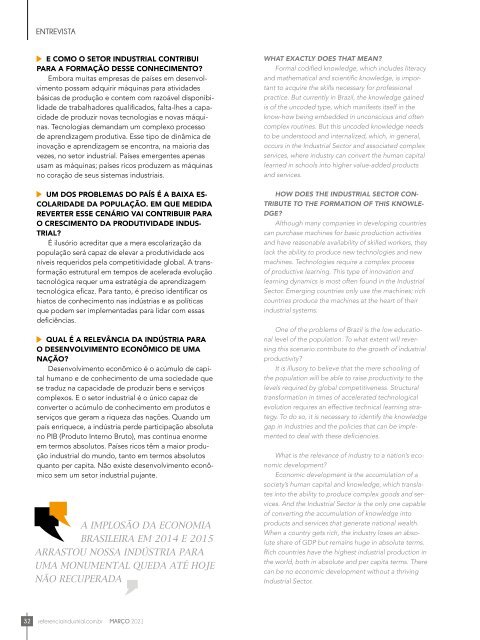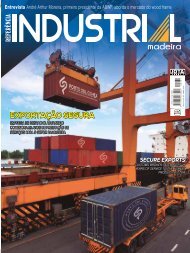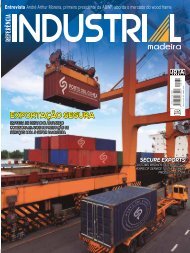*Março:2021 Referência Industrial 227
You also want an ePaper? Increase the reach of your titles
YUMPU automatically turns print PDFs into web optimized ePapers that Google loves.
ENTREVISTA<br />
E COMO O SETOR INDUSTRIAL CONTRIBUI<br />
PARA A FORMAÇÃO DESSE CONHECIMENTO?<br />
Embora muitas empresas de países em desenvolvimento<br />
possam adquirir máquinas para atividades<br />
básicas de produção e contem com razoável disponibilidade<br />
de trabalhadores qualificados, falta-lhes a capacidade<br />
de produzir novas tecnologias e novas máquinas.<br />
Tecnologias demandam um complexo processo<br />
de aprendizagem produtiva. Esse tipo de dinâmica de<br />
inovação e aprendizagem se encontra, na maioria das<br />
vezes, no setor industrial. Países emergentes apenas<br />
usam as máquinas; países ricos produzem as máquinas<br />
no coração de seus sistemas industriais.<br />
UM DOS PROBLEMAS DO PAÍS É A BAIXA ES-<br />
COLARIDADE DA POPULAÇÃO. EM QUE MEDIDA<br />
REVERTER ESSE CENÁRIO VAI CONTRIBUIR PARA<br />
O CRESCIMENTO DA PRODUTIVIDADE INDUS-<br />
TRIAL?<br />
É ilusório acreditar que a mera escolarização da<br />
população será capaz de elevar a produtividade aos<br />
níveis requeridos pela competitividade global. A transformação<br />
estrutural em tempos de acelerada evolução<br />
tecnológica requer uma estratégia de aprendizagem<br />
tecnológica eficaz. Para tanto, é preciso identificar os<br />
hiatos de conhecimento nas indústrias e as políticas<br />
que podem ser implementadas para lidar com essas<br />
deficiências.<br />
QUAL É A RELEVÂNCIA DA INDÚSTRIA PARA<br />
O DESENVOLVIMENTO ECONÔMICO DE UMA<br />
NAÇÃO?<br />
Desenvolvimento econômico é o acúmulo de capital<br />
humano e de conhecimento de uma sociedade que<br />
se traduz na capacidade de produzir bens e serviços<br />
complexos. E o setor industrial é o único capaz de<br />
converter o acúmulo de conhecimento em produtos e<br />
serviços que geram a riqueza das nações. Quando um<br />
país enriquece, a indústria perde participação absoluta<br />
no PIB (Produto Interno Bruto), mas continua enorme<br />
em termos absolutos. Países ricos têm a maior produção<br />
industrial do mundo, tanto em termos absolutos<br />
quanto per capita. Não existe desenvolvimento econômico<br />
sem um setor industrial pujante.<br />
A IMPLOSÃO DA ECONOMIA<br />
BRASILEIRA EM 2014 E 2015<br />
ARRASTOU NOSSA INDÚSTRIA PARA<br />
UMA MONUMENTAL QUEDA ATÉ HOJE<br />
NÃO RECUPERADA<br />
WHAT EXACTLY DOES THAT MEAN?<br />
Formal codified knowledge, which includes literacy<br />
and mathematical and scientific knowledge, is important<br />
to acquire the skills necessary for professional<br />
practice. But currently in Brazil, the knowledge gained<br />
is of the uncoded type, which manifests itself in the<br />
know-how being embedded in unconscious and often<br />
complex routines. But this uncoded knowledge needs<br />
to be understood and internalized, which, in general,<br />
occurs in the <strong>Industrial</strong> Sector and associated complex<br />
services, where industry can convert the human capital<br />
learned in schools into higher value-added products<br />
and services.<br />
HOW DOES THE INDUSTRIAL SECTOR CON-<br />
TRIBUTE TO THE FORMATION OF THIS KNOWLE-<br />
DGE?<br />
Although many companies in developing countries<br />
can purchase machines for basic production activities<br />
and have reasonable availability of skilled workers, they<br />
lack the ability to produce new technologies and new<br />
machines. Technologies require a complex process<br />
of productive learning. This type of innovation and<br />
learning dynamics is most often found in the <strong>Industrial</strong><br />
Sector. Emerging countries only use the machines; rich<br />
countries produce the machines at the heart of their<br />
industrial systems.<br />
One of the problems of Brazil is the low educational<br />
level of the population. To what extent will reversing<br />
this scenario contribute to the growth of industrial<br />
productivity?<br />
It is illusory to believe that the mere schooling of<br />
the population will be able to raise productivity to the<br />
levels required by global competitiveness. Structural<br />
transformation in times of accelerated technological<br />
evolution requires an effective technical learning strategy.<br />
To do so, it is necessary to identify the knowledge<br />
gap in industries and the policies that can be implemented<br />
to deal with these deficiencies.<br />
What is the relevance of industry to a nation’s economic<br />
development?<br />
Economic development is the accumulation of a<br />
society’s human capital and knowledge, which translates<br />
into the ability to produce complex goods and services.<br />
And the <strong>Industrial</strong> Sector is the only one capable<br />
of converting the accumulation of knowledge into<br />
products and services that generate national wealth.<br />
When a country gets rich, the industry loses an absolute<br />
share of GDP but remains huge in absolute terms.<br />
Rich countries have the highest industrial production in<br />
the world, both in absolute and per capita terms. There<br />
can be no economic development without a thriving<br />
<strong>Industrial</strong> Sector.<br />
32 referenciaindustrial.com.br MARÇO <strong>2021</strong>

















